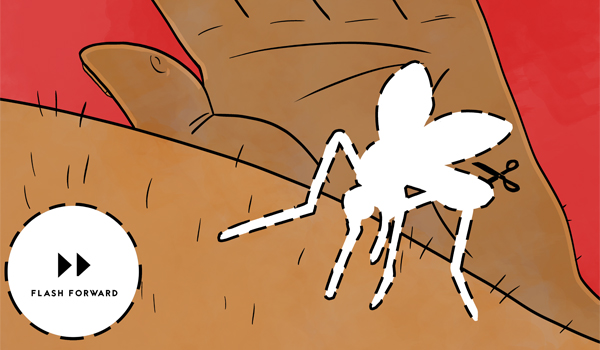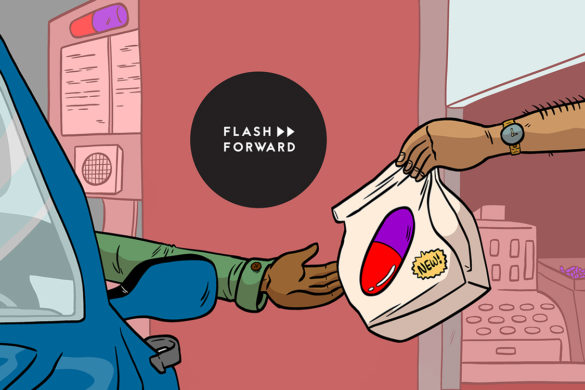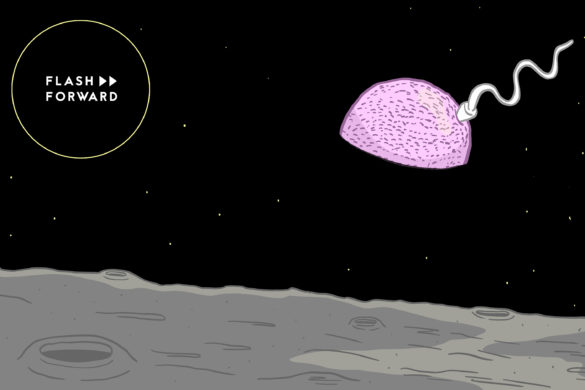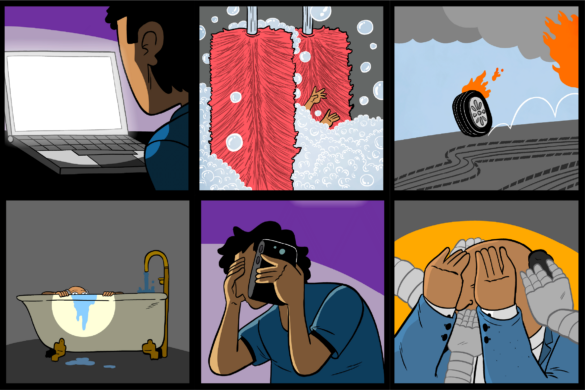Today we travel to a future where humans have decided to eradicate the most dangerous animal on the planet: mosquitos. How would we do it? Is it even possible? And what are the consequences?
Mosquitos have worked hard to earn the nickname “deadliest animal on earth.” According to the World Health Organization there are 20 million cases of dengue virus every year. And there are 214 million cases of malaria, 438,000 of which are deadly. In the United States, an outbreak of West Nile Virus that started in 1999 infected 41,000 people and killed 1700 of them. Since 2005, there have been 1.9 million cases of Chickungunya virus documented in East Asia, and as of last year 1.3 million cases of the virus had been documented in the US and Latin America. Yellow Fever infects 200,000 people every year, and kills about 30,000 of those people.
All of these diseases are carried by mosquitos. For comparison, snakes kill about 50,000 people a year. Humans kill about 475,000 other humans every year. And mosquitos, all told, kill 725,000 people each year.
And recently, with the rise of Zika, people have started wondering aloud once again why we don’t just get rid of the biting bugs.
Whenever you talk about eliminating a whole species, or, in the case of every mosquito, a few thousand species, the question of ecology looms. How important are these animals? What relies on them for food or protection or pollination? According to Cameron Webb, a medical entomologist with the University of Sydney, we still don’t know very much about the role mosquitoes play in the ecosystem.
Unsurprisingly, most of the research that’s done on mosquitoes is done on either how to kill them, or what diseases they might give us. There’s not a ton of work done on their importance in the environment. So we don’t know what might happen to the ecosystem if we were to eliminate them entirely.
What we do know is that we’ve been fighting mosquitoes for a really long time. The CDC was actually founded in response to malaria. And Maryn McKenna, who you might remember from our episode on antibiotic resistance, came back for this episode to tell us about the history of trying to control these mosquito borne illnesses.
So how do we actually kill all these bugs? It won’t be easy. Mosquitoes are sneaky, particularly the species that transmit disease to humans. This future probably involves a combination of things: pesticides, land management, education, and genetic modification. Not on humans, like we talked about in episode 20 from last season. But of the mosquitoes themselves.
To explain how genetically modified mosquitos worked, we talked to Hayden Parry, the CEO of a company called Oxitec that developed and grows these modified insects. The basic premise behind them is to engineer male mosquitoes that can’t produce viable baby mosquitoes. These males mate with regular females, and their offspring all die, thus controlling the population.
All that and more in this week’s episode, so have a listen.
And, on a more fun note: here’s a paper that tries to compile all the places insects show up in fiction. And here’s the trailer of the terribly-looking 1993 movie called Skeeter. IMDB’s plot summary goes like this: “As the result of a corrupt businessman’s illegal toxic waste dumping, a small desert town is beset by a deadly swarm of huge bloodthirsty mutant mosquitoes!”
What do you think? If you have strong feelings about this future, if you’re vehemently anti-mosquito or 100% for keeping the little buzzers around, call and tell us why! This is a new experiment I’m trying, but I want to hear from you. Call us at (347) 927-1425 and leave a message with your opinion. Or you can email us a voice memo at info@flashforwardpod.com. Should we plan the ultimate swatting, or leave them be?
Flash Forward is produced by me, Rose Eveleth, and is part of the Boing Boing podcast family. The intro music is by Asura and the outtro music is by Broke for Free. Today’s future voices come from Molly Sauter and Robert Brenner. The episode art is by Matt Lubchansky.
If you want to suggest a future we should take on, send us a note on Twitter, Facebook or by email at info@flashforwardpod.com. We love hearing your ideas! And if you think you’ve spotted one of the little references I’ve hidden in the episode, email us there too. If you’re right, I’ll send you something cool.
And if you want to support the show, there are a few ways you can do that too! We have a Patreon page, where you can donate to the show. But if that’s not in the cards for you, you can head to iTunes and leave us a nice review or just tell your friends about us. Those things really do help.
That’s all for this future, come back next week and we’ll travel to a new one.
▹▹▹▹▹▹▹▹▹▹▹▹▹▹▹▹▹▹▹▹▹▹▹▹▹▹▹▹▹▹▹▹▹▹▹▹▹▹▹▹▹▹▹▹▹▹▹▹▹▹▹▹▹▹▹▹▹▹▹▹▹▹▹▹▹▹
TRANSCRIPT
Hello and welcome to Flash Forward. I’m Rose and I’m your host. Flash Forward is a podcast about the future. Every week we explore a specific possible or… not so possible future scenario. Everything from space pirates to antibiotic resistance. Every episode starts with a little field trip to the future, before we zip back to today, to talk to experts about how that future might really go down.
This week, let’s start in the year 2021
[shuffling of papers]
Politician: Good afternoon Chairman Yeerk, Ranking Member Ax, and members of the Subcommittee. Thank you for the opportunity to testify before you today and for your ongoing support for the Centers for Disease Control and Prevention’s (CDC) work in global health. CDC works 24-7 to save lives and protect people against health threats.
As per our agreement with congress, the CDC has adopted a computerized modeling system for financial decisions over 1.3 billion dollars. Since this proposed set of initiatives greatly exceeds that number, we will use the GANGES RED system to determine the best outcome.
We have fed the computer data on mosquito borne disease outbreaks, mosquito ecology, the chemistry of pesticides, and the genetic malleability of the insects. The system has also scraped the web to consider social media, blog and news content about this issue to weigh the arguments for and against each plan. A full report on processing time and the total data crunched in this decision tree should be showing up on your screens now. You’ll find full text report under the tab labeled Decision #18.
With that I’d like to let the system read the outcome.
[whirring]
Computer Voice: Hello. You have told me many things about mosquitoes. There are many possible outcomes to each of the decisions I might make. But based on the data I have been provided, and the data that I have gathered, the optimal solution for humans is as follows. Eliminate the following mosquito species:
Aedes aaegyptii
Aedes albopictus
Aedes fitchii
Aedes fulvus pallens
Aedes grossbecki
Aedes infirmatus
Aedes japonicus
Aedes melanimon
Aedes nigromaculis
Aedes provocans
Aedes sollicitans
Aedes squamiger
Aedes sticticus
Aedes stimulans
Aedes taeniorhynchus
Aedes triseriatus
Aedes trivittatus
Aedes vexans
Anopheles atropos
Anopheles barberi
Anopheles bradleyi/crucians
Anopheles franciscanus
Anopheles freeborni
Anopheles hermsi
Anopheles punctipennis
Anopheles quadrimaculatus
Anopheles walkeri
Coquillettidia perturbans
Culiseta melanura
Culex apicalis
Culex bahamensis
Culex coronator
Culex erraticus
Culex erythrothorax
Culex nigripalpus
Culex pipiens
Culex quinquefasciatus
Culex restuans
Culex salinarius
Culex stigmatosoma
Culex tarsalis
Culex territans
Culex thriambus
Culiseta incidens
Culiseta impatiens
Culiseta inornata
[SIREN][Megaphone]: Please return to your homes. Designated public safety sprays are beginning in 20 minutes. Anyone outside their homes will be escorted to the nearest precinct. Listen for the all clear sign before leaving your homes.
[Helicopter]
[Fade out]
Okay so in this future we decide to eradicate all mosquitos.This is something people have proposed for a long time, but it’s been in the news again recently because of the Zika virus. Now getting Zika is mostly just kind of annoying — four out of five people who get it never show any symptoms at all, and those who do feel achey and get a fever but rarely experience anything worse than that. The problem, and the reason that you’ve probably heard of Zika, is that the Zika virus seems to be connected to a rise in birth defects. So pregnant women who get Zika might, for reasons that nobody really understands yet, give birth to babies with something called microephaly, which is basically an abnormally small head and brain.
It’s hard to say just how many cases of Zika virus there are, or how many birth defects are actually related to Zika, but what we do know is that Zika isn’t the only mosquito borne disease and it’s not even close to the most deadly. Not by a long shot. Here are some statistics:
According to the World Health Organization there are 20 million cases of dengue virus every year. And there are 214 million cases of malaria, 438,000 of which are deadly. In the United States, an outbreak of West Nile Virus that started in 1999 infected 41,000 people and killed 1700 of them. Since 2005, there have been 1.9 million cases of Chickungunya virus documented in East Asia, and as of last year 1.3 million cases of the virus had been documented in the US and Latin America. Yellow Fever infects 200,000 people every year, and kills about 30,000 of those people.
That’s a lot of numbers, but all of these diseases are carried by mosquitos. In fact, some people call mosquitoes the deadliest animal in the world. For comparison, snakes kill about 50,000 people a year. Humans kill about 475,000 other humans every year. And mosquitos, all told, kill 725,000 people each year.
So what would happen, if we just, got rid of them? Would we miss them? Would ecosystems collapse? Would we all just be fine?
To answer those questions I called up Dr. Cameron Webb.
Cameron Webb: I don’t think many other people track mosquito outbreaks as perhaps much as I do. My name is Dr. Cameron Webb, I’m a medical entomologist with the University of Sydney and New South Whales Health Pathology here in australia.
He’s the guy that everybody in Australia goes to with mosquito questions.
Webb: If a drunk person passes out on the edge of the wetland are they going to die from blood loss from mosquitos?
Rose: People ask you that?
Webb: Yes
Rose: I assume the answer is no?
Webb: No I don’t think so
Rose: That’s good. So, just how important are mosquitoes? If we get rid of them, what happens? The short answer is that we don’t know.
Webb: There are some real gaps in our knowledge about the ecological role of mosquitos and the role they play in the environment and one of the reasons for that is because it just hasn’t been studies. I guess it comes as no surprise when scientists are drawing up a list of priorities for mosquito research understanding why the spread disease and understanding how better to kill them is a higher priority than working out what mosquitoes might find important to thier life.
What we do know is that a lot of animals eat mosquitos. Birds, bats, other insects. But we don’t really know how important that food source is for them.
Webb: We had a look at these insectivorous bats, and student of mine collected a whole lot of bat poo and what we did was looked for the presence of mosquito DNA and moth DNA. And what we found was that all the bats were eating moths, but only about half of the very smallest bats were eating mosquitos. And what we really concluded from this is that these mosquitos ey were more a snack food than a staple in the diets of these bats.
Rose: And these mosquitoes that the bats eat, they’re usually not the ones that transmit disease to humans.
It turns out there are somewhere 3 and 4 thousand different species of mosquitos. And most of them don’t kill us. It’s actually just a small handful that carry most of the really bad diseases that we talked about earlier. And the one that is the most dastardly is called the aedes aegyptii.
Webb: Aedes aegyptii is a fantastic vector of dengue virus, chikungunya virus, the yellow fever virus, Zika virus as well. And so it’s the yellow fever mosquito at the moment that is driving the outbreak of Zika virus in the Americas.
Rose: If we’re going to try and kill all the mosquitos, this one should be first on the hit list. For a whole bunch of reasons.
Webb: This is a mosquito that is found in relatively low abundance. One of the reasons it drives these big outbreaks of disease is not because there’s so many of them but because they have a habit of taking a whole series of small blood meals when they’re feeding. So what that means is that instead of a wetland mosquito biting an animal once to get it’s whole blood meal for each generation of eggs, the yellow fever mosquito might be biting a whole lot of people so it has the potential to infect a lot more people in its lifetime.
Maryn McKenna: The Aedes aegyptii is a sneaky mosquito. It has a unique ability to sort of, bite you when you’re not expecting. It does things like it goes for the back of the knee and the back of the neck and so forth. Places where you might forget to cover up. Or you might forget to spray your repellant. And it also breeds in really tiny places like literally upturned bottle caps full of water are a perfectly happy home for an Aedes aegyptii to produce more of that species.
That’s Maryn McKenna, a journalist who covers public health and diseases. You might remember her from our episode on antibiotic resistance, and she’s back to give you more nightmares.
McKenna: There’s even a phenomenon called airport malaria. It happens at least once a year in most parts of the united states that a mosquito carrying the malaria parasite flies out of a cargo hold and infects someone in the vicinity of an airport.
Rose: And McKenna says that we’ve been fighting against the Aedes aegyptiii for a really long time.
McKenna: So in 1793 there was an epidemic of yellow fever in Philadelphia that killed about ten percent of the city. At that point, Philadelphia was the capital, and they actually had to relocate the capital because the epidemic was so bad. In 1853 there was an outbreak in New Orleans that was so bad that the city authorities suppressed the news of it. And unfortunately I have to say it’s a bad mark for our profession that the press cooperated with it because they were worried that if the news got out, New Orleans being such a major port, at that point I guess the major port of the Southern United states, that the city would be quarantined and trade would be shut down and the city’s life blood would be cut off. So thousands of people died. In 1879 there was an epidemic of yellow fever in memphis it killed a third of the city. One historian called it the worst urban disaster in american history. Let’s see, In 1885 there was a dengue outbreak in Austin. Austin at the time had 22,000 people it was a very small town, and 16,000 of them got sick. And there were outbreaks of dengue in Charleston, and Savannah and Galveston.
Rose: And America responded to all of this kind of in the same way we’re responding to it now: trying to figure out how to get rid of mosquitos.
McKenna: What ended malaria in the United States was sort of the first big mobilization of public health in the United States, which was the founding of the CDC. Which we now know as the Center for Disease Control and Prevention which is the public health agency of the US and effectively the disease police for the world. But when that agency started in the early days of World War II, it was called the Office of Malaria Control in War Areas. Which makes a really bad acronym, no wonder they changed it. And the reason they needed a TK was because most of the big places that were pushing along the war mobilization, Fort Benning, the places that made battleships like the places that put soldiers onto battleships, Newport, the places that made Sherman tanks, all the big places of production of people and material were almost all in the South where malaria was an endemic disease. Malaria took out so much of the productivity of the war effort that they actually needed a government office to keep it down. So all the CDC could do at the time was use things like machine oil to literally go out and spray ditches along the road side to make sure that mosquito larvae were killed.
Rose: And eventually they turned to DDT, which is VERY good at killing mosquitoes.
In 1958 Brazil was declared completely free of aedes aegyptiii by the Pan-American Health Organization. And the United States stopped seeing big outbreaks of mosquito borne diseases for years. But we don’t use DDT anymore, because of its impacts on the environment. So now, mosquitoes, carrying their diseases, are coming back. Brazil has Zika. The United States has cases of yellow fever again. And we’re once again trying to picture a future without mosquitos.
So, without using DDT, how do that? How do we get rid of mosquitoes? Humans are quite good at causing the extinctions of larger animals: we’ve managed to kill all the dodos, the bali tigers, the moas, the japanese sea lions, the great auks, the thylacines, the guam flying foxes, the western black rhinos, et cetera et cetera et cetera. But mosquitoes are a lot trickier.
Webb: I would not like to be in charge of eradicating mosquitoes, it would be a tough job, and one of the reasons is that mosquitoes, particularly these urban mosquitoes like the yellow fever mosquito, they’re so secretive. There’s places where they’re breeding and hiding and out of view that getting to all of them would be extremely difficult.
So how do we do it? Probably using a combination of things: pesticides, land management, education, and, more recently, people have been talking about using genetic modification. Not on humans, like we talked about in episode 20 from last season. But of the mosquitoes themselves.
Hayden Parry: So what this means is we release males, because male mosquitoes don’t bite you, only females do. So we release the males, carrying this self limiting gene. They go off, they mate with females, and then all of the offspring die, and that’s it relly, pure and simple.
Rose: That’s Hadyn Parry, he’s the CEO of a company called OxiTec that makes these genetically modified mosquitoes. And the nice thing about this design is that these mosquitoes can’t really go awry like other forms of pest control can.
Parry: Our mosquitos will only do one of two things: they’ll either find a female, mate with her and the offspring will die and they’ll die anyway. Or they won’t find the female in which case they’ll die. So this is the approach that doesn’t spread in the environment, doesn’t persist, and can be used to control a mosquito population in an area.
Rose: In some situations these mosquitos work really well at tamping down the population. But there are challenges to this approach too.
Webb: The big problem with a lot of these approaches is that they’re not a self sustaining approach to controlling mosquito populations in that you would continually have to be releasing the modified mosquitos.
Rose: And if we wanted to get rid of ALL the mosquitos in the world. All of them. Every last one. Could we even do it with genetically modified males?
Parry: Not really with our approach to be honest, I mean our approach is very localized and targeted. And the reason for that is mosquitoes don’t fly very far. So in its lifetime a male or a female mosquito will only travel 200 yards, 200 meters, in its entire lifetime. We’ll release our males and they will only actually have an effect in the 200 meter or yard radius of where we release them, because that’s just how far they can fly. So you’ve really got to plan and target what you do, now you can clearly release them throughout the whole city so that you’ve covered a whole city. And you could do that across many cities, but it would be a little bit impractical to want to do that across whole countries.
Rose: Probably what you’d have to do is combine all these approaches. But some people are wondering whether we’re approaching this whole thing from the wrong direction. Why spend so much money on mosquitos and not, say, the viruses they carry.
Webb: I think sometimes we have to change our perspective on things because we think about mosquitos causing the disease but in many respects they’re innocent bystanders in this process and it’s the viruses and pathogens that are taking advantage of the mosquitoes to spread from host to host. And so, I think my gut feeling is that if we had a finite pool of resources it might be much easier to develop a vaccine and distribute it to people rather than come up with a new insecticide and try to spray every single mosquito on the planet.
Rose: Parry has an answer to that though. He says that simply having mosquitos around in the first place opens us up to diseases we didn’t even know about.
Parry: The sad thing is that a couple of years ago we had chikungunya coming into the Caribbean area. so there was one case in Saint Martin in December 2013, and then within a year there was over a million cases all through the Caribbean and Central America. And that just goes to show what happens if you bring a new virus into an area where you already have got this mosquito sitting there with its unique capability of spreading disease. Zika is the next one in line and I think now there is a lot more understanding that this time round something has got to be done and we really must find a way for controlling this. But but Zika equally, I hate to say this, but it won’t be the last virus that this mosquito transmits. There will be others.
Rose: But getting rid of just one species of mosquito could backfire. What if another species realizes that there’s this great opening that it could just bite all these people because the Aedes aaegyptiii is gone now. And then you just have another mosquito taking its place and transmitting those viruses again.
Webb: It doesn’t matter how much our technology improves or how developed we’ve become. Mosquitoes simply don’t go anywhere and we continue to get these emergence and reemergence of these mosquito borne diseases that we didn’t think were that important or we thought we had them beat.
Rose: When I planned this episode I figured that McKenna would be in favor of getting rid of mosquitos, and Webb would be against it. She’s the public health person and he’s the mosquito guy. But actually, the opposite happened.
Rose: If you were ruler of the world and you were asked should we make these mosquitoes extinct at whatever cost would you say yes or no.
Webb: I think I would feel quite comfortable signing off on the eradication of the yellow fever mosquito. Because I think that the potential ecological or environmental knock on effects to that would be relatively low compared to the significant benefit to human health internationally. However on no way in the world would I sign off on the eradication of some of the more abundant mosquitoes associated with wetland and bushland areas because i have little doubt that they’re playing a potentially significant role in the life cycles of some of our insectivorous wildlife. One species yeah I’m happy to kind of maybe get rid of that, but for the thousands of others I’m happy to live on a planet with them.
McKenna: I would use the scientific dodge of more data needed. It’s so much more dramatic to say oh yeah kill all those buzzers, but you know as someone who writes about public health and epidemics and disasters I live my life in the realm of unintended consequences. So as a result when it comes to big actions I’m very conservative because I can look back at the history that I write about and see that big actions have also often ended us up in places where we really didn’t intend to be.
I asked Parry a slightly different question. I know he’s all for getting rid of aedes aegyptiii, but what if he had to pick between getting rid of ALL the mosquitos, or getting rid of none of them?
Parry: Woah! I think would get rid of mosquitoes if I had the choice, I don’t like them.
As with most futures we travel to we really don’t know enough to know how this might go down. We could spend billions on trying to get rid of aedes aegyptiii, only to watch another mosquito take its place. Or we could watch a collapse in bat species who were secretly eating the mosquitoes we eliminated. Or we could save millions of lives. Or all three of those things could happen at the same time! The future is bound to be confusing.
What do you think? If you have strong feelings about this future, if you’re vehemently anti-mosquito or 100% for keeping the little buzzers around, call and tell us why! This is a new experiment I’m trying, but I want to hear from you. Call us at (347) 927-1425 and leave a message with your opinion. Or you can email us a voice memo at info@flashforwardpod.com. Should we plan the ultimate swatting, or leave them be?
Flash Forward is produced by me, Rose Eveleth, and is part of the Boing Boing podcast family. The intro music is by Asura and the outtro music is by Broke for Free. The voices of this future are by Molly TK and Robert Brenner. The episode art is by Matt Lubchansky.
If you want to suggest a future we should take on, send us a note on Twitter, Facebook or by email at info@flashforwardpod.com. We love hearing your ideas! And if you think you’ve spotted one of the little references I’ve hidden in the episode, email us there too. If you’re right, I’ll send you something cool.
And if you want to support the show, there are a few ways you can do that too! We have a Patreon page, where you can donate to the show. But if that’s not in the cards for you, you can head to iTunes and leave us a nice review or just tell your friends about us. Those things really do help.
That’s all for this future, come back next week and we’ll travel to a new one.











21 comments
[…] ▹▹ Full show notes […]
[…] ▹▹ Full show notes […]
[…] ▹▹ Full show notes […]
[…] ▹▹ Full show notes […]
[…] ▹▹ Full show notes […]
Wanted to listen but the only way I could get the episode was to find the mp3 url in the source of the rss feed. A direct link on the page would be helpful.
Hi Greg!
There’s a player embedded directly in the post. Can you see it? It’s the big square box that has a little play button in it.
Rose, unfortunately, the play button does not work for me either (using two different browsers). Maybe they should try to make it simpler and forego all of the fancy gimmicks.
Weird! Do you mind if I email you to see why this is happening and pass that along to Acast so they can try to fix it? Are you using any blockers on your browsers? I can play it, and I know other people can, so it would be great to figure out what’s keeping it from working on your end so we can fix it.
Do you have a transcript? My reading comprehension is great, listening, not so much.
Patrons get transcripts! https://www.patreon.com/roseveleth?ty=h
If we have to listen, many will never be here long enuf to become a patron, Too busy. Bye.
Non-Vid watcher, Non-TV owner
[…] Meanwhile, Rose Eveleth imagined a future totally devoid of mosquitoes at her podcast Flash Forward. […]
[…] Meanwhile, Rose Eveleth imagined a future totally devoid of mosquitoes at her podcast Flash Forward. […]
[…] Meanwhile, Rose Eveleth imagined a future totally devoid of mosquitoes at her podcast Flash Forward. […]
Just found the podcast and am very interested to know what song you have at the beginning of the podcast every episode?
It’s a song by Asura called Whispering Through: http://freemusicarchive.org/music/Asura/Bonus_Beat_Blast_2011/09_asura-whispering_through
Genetic modification of of mites was done in Spain a while back to protect crops, same idea, to make the offspring unable to reproduce. How did that work out? It could give us a good idea of how things might play out if we did the same thing to mosquitoes.
[…] Listen to Episode 04: The Ultimate Swatting […]
Mini drones. Armed with low level lazers.
https://www.youtube.com/watch?v=eYXPqrXZ1eU
[…] The Ultimate Swatting ~~ original Flash Forward episode […]